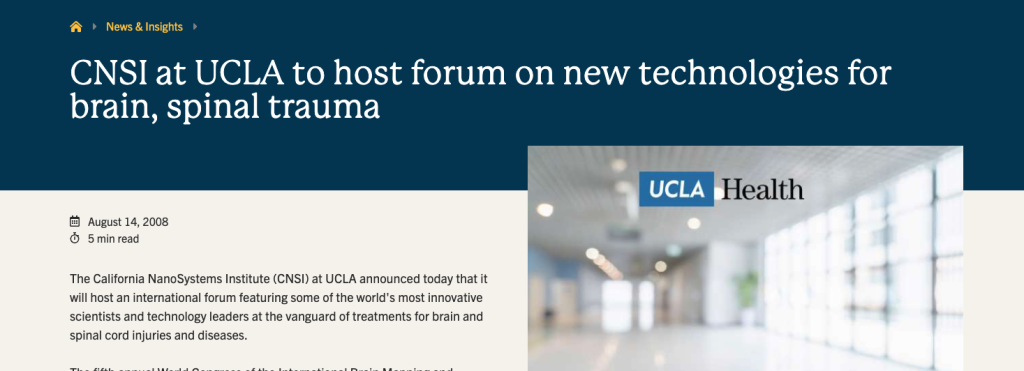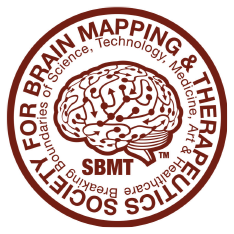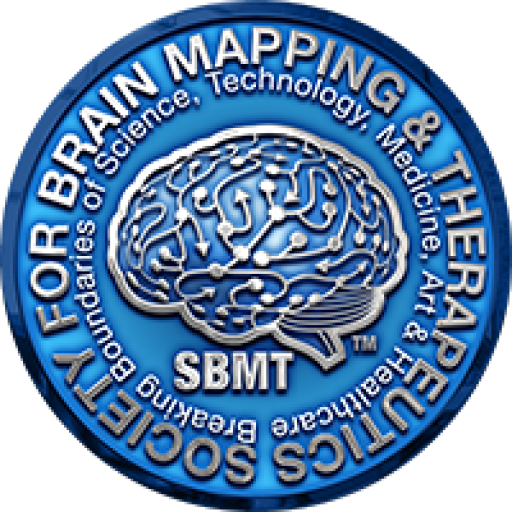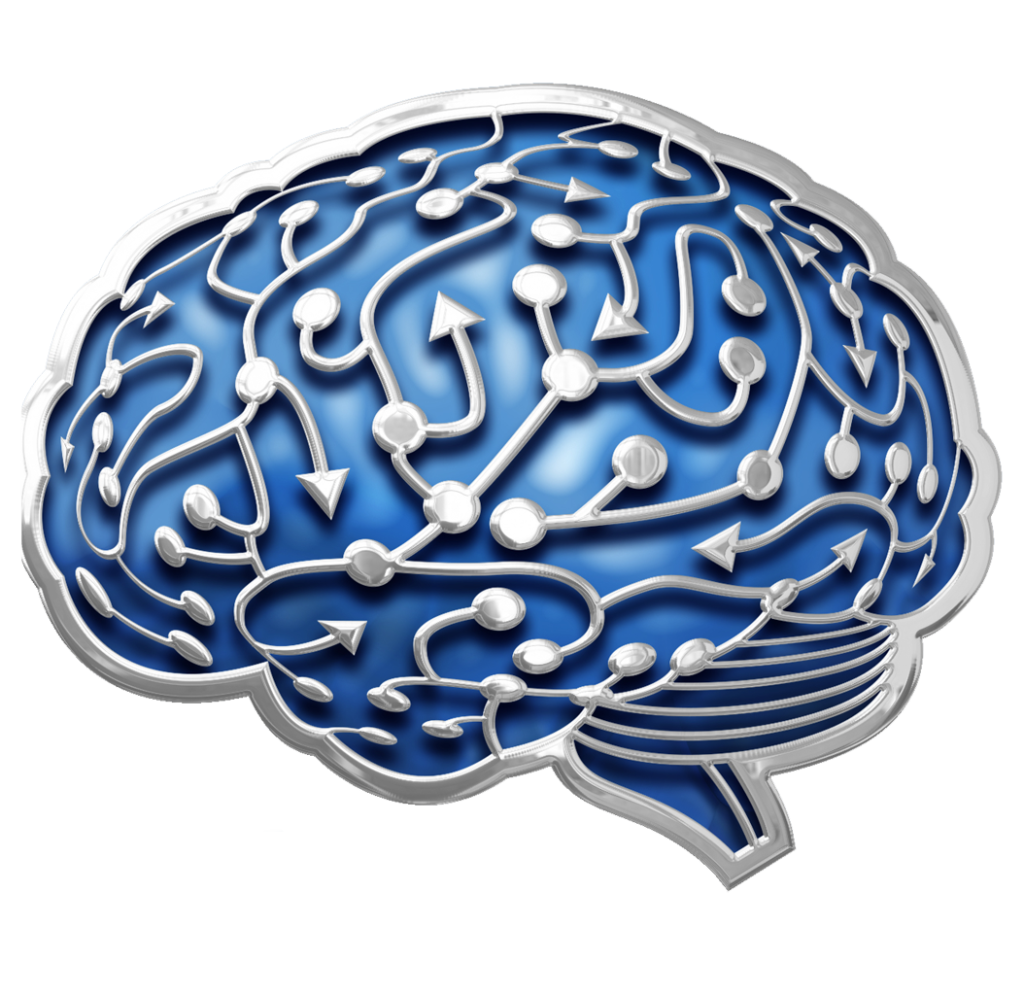
August 14, 2008
5 min read
The California NanoSystems Institute (CNSI) at UCLA announced today that it will host an international forum featuring some of the world’s most innovative scientists and technology leaders at the vanguard of treatments for brain and spinal cord injuries and diseases.
The fifth annual World Congress of the International Brain Mapping and Intraoperative Surgical Planning Society (IBMISPS), to be held at the CNSI on the UCLA campus from Tuesday, Aug. 26, to Friday, Aug. 29, will highlight new treatments based on innovations in intraoperative surgical planning and brain-mapping. The advances that will be discussed underscore the benefits of a multidisciplinary approach to bridging science and technology in order to accelerate medical breakthroughs.
“Many of the technologies that are influencing medicine as it relates to the brain and spinal cord involve nanotechnology, and hosting this conference at CNSI is an opportunity to stimulate discussion and fortify our relationship with a cutting-edge field,” said the CNSI’s interim director, Leonard H. Rome. “CNSI has been built entirely on the spirit of multidisciplinary cooperation among engineers, clinicians and basic scientists. We share this vision with IBMISPS and are delighted to host this event to spur a lively and thought-provoking discussion.”
During the four-day meeting, scientists and physicians will illustrate and debate how the fields of science and technology converge in medicine and ultimately serve to enhance the lives of people who suffer from trauma to the brain and spinal cord. The meeting will explore post-traumatic stress disorder (PTSD) and traumatic brain injury (TBI), two of the most prevalent injuries experienced by veterans returning from Iraq and Afghanistan.
“PTSD and TBI are prescient topics, as more and more veterans return from war in need of effective treatments,” said Dr. Babak Kateb, founding executive director and chairman of the board of directors of the IBMISPS. “Officials from the Department of Defense, which has earmarked $300 million this summer for PTSD and TBI research, will be exchanging ideas and comparing notes with world-class scientists and surgeons to explore unconventional approaches to these significant health care issues.”
A guest appearance will be made by two-time Academy Award winner Dustin Hoffman, who co-starred in the 1988 film “Rain Man” about an autistic savant. Hoffman played Raymond Babbitt, who was based in part on Kim Peek, a savant whose eidetic, or photographic, memory and developmental disabilities were the possible result of congenital brain abnormalities. Hoffman will receive the 2008 IBMISPS Beacon Award for Raising Awareness about Neurological Disease.
One of the major challenges of the new millennium is translating the advances made in other fields of science and technology into medicine. The IBMISPS is committed to partnering with institutions, government agencies, policymakers and industry leaders to facilitate the translation of cutting-edge science and technology from other disciplines into medicine.
“Improved neurosurgical techniques and tools for neuroimaging and brain-mapping are required for treating medical challenges such as neurodegenerative diseases and inoperable brain cancer,” said Dr. Patrick Soon-Shiong, chairman and chief executive officer of Abraxis BioScience Inc., which is co-sponsoring the forum. “The discovery process toward breakthrough therapies will be significantly accelerated through multidisciplinary research and innovation. Thus, it is my sincere hope that the interaction of world-class scientists gathered at this congress will expand the realm of possibilities for each researcher and promote cross-disciplinary collaboration.”
Soon-Shiong, one of the keynote speakers at this year’s congress, is also a member of the CNSI Advisory and Oversight Board.
Other keynote speakers include Leonard H. Rome, interim director of the CNSI and senior associate dean of research at the David Geffen School of Medicine at UCLA; Dr. Ron Kikinis, founding director of the Surgical Planning Laboratory and director of the National Center for Image Guided Therapy at the Harvard University Medical School; Dr. Ron Von Jako, chief medical officer and surgical development leader at GE Healthcare Surgery; Dr. Christian Macedonia, chief of research operations at the U.S. Army’s Telemedicine and Advanced Technology Research Center; California state Sen. Mark Ridley Thomas; and Herb Schultz, senior health policy advisor for the California Office of the Governor.
The International Brain Mapping and Intraoperative Surgical Planning Society is a nonprofit association organized for the purpose of encouraging basic and clinical scientists who are interested or active in areas of brain-mapping and intraoperative surgical planning to share their findings with other physicians and scientists across the disciplines, including neurosurgery, radiology, neurology, biotechnology, anthropology and neuroscience. The association also promotes the public welfare through the advancement of intraoperative surgical planning and brain-mapping, a commitment to excellence in education, and a dedication to research and scientific discovery. The association’s mission will be achieved through multidisciplinary collaboration involving government agencies, patient advocacy groups, educational institutes and private sector industry brought together in order to address issues and problems related to brain-mapping and intraoperative surgical planning and to implement new technologies to benefit patient care. For additional information, visit www.ibmisps.org.
The California NanoSystems Institute at UCLA is an integrated research center operating jointly at UCLA and the University of California, Santa Barbara, whose mission is to foster interdisciplinary collaborations for discoveries in nanosystems and nanotechnology; train the next generation of scientists, educators and technology leaders; and facilitate partnerships with industry, fueling economic development and promoting the social well-being of California, the United States and the world. The CNSI was established in 2000 with $100 million from the state of California and an additional $250 million in federal research grants and industry funding. At the institute, scientists in the areas of biology, chemistry, biochemistry, physics, mathematics, computational science and engineering are measuring, modifying and manipulating the building blocks of our world atoms and molecules. These scientists benefit from an integrated laboratory culture enabling them to conduct dynamic research at the nanoscale, leading to significant breakthroughs in the areas of health, energy, the environment and information technology. For more information, visit www.cnsi.ucla.edu.
Media Contact:
Jennifer Marcus




